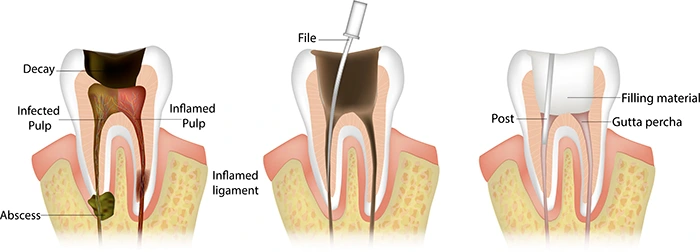
Proper oral hygiene habits can keep your teeth healthy and strong for a lifetime. However, sometimes no matter how vigilant you are with your oral care habits, certain factors can cause tooth decay and other damage.
Dr. Afroz Burges Family and Cosmetic Dentistry offers a variety of options for treating damaged or decayed teeth, including root canal treatment. These procedures can usually salvage the natural tooth and prevent extraction.
Root canal treatment has a 95% success rate over the patient’s lifetime. Millions of these procedures are done every year and most patients are happy with their results. Even with such a high success rate, there are a few factors that could cause the procedure to fail.
In this article, we’ll discuss what you need to know about root canal treatment failure, including the causes, signs/symptoms, and treatment options.
Root canal treatment is often recommended for teeth that are too damaged or decayed for a dental filling. This is a fairly extensive procedure that involves removing the dental pulp, which is the center layer of the tooth.
The dentist will first administer local anesthesia. If patients have dental anxiety or difficulty sitting still, sedation may be an option. Once the anesthesia has taken effect, a small hole will be drilled in the tooth. The infected dental pulp will be removed from the tooth and the inside of the tooth will be disinfected to remove any remaining bacteria.
A biocompatible, plastic-like material will be used to fill in the tooth to protect and support it from the inside. Then, the tooth will be sealed with a dental filling. Most of the time, a dental crown is placed over the tooth to protect it further.
Root canal treatment has a very high success rate, which means that most patients who have root canal treatment have no additional future issues with the affected tooth. However, as with any medical/dental procedure, there are risks- including failure. Failed root canal treatment refers to the re-infection of a treated tooth.
According to the American Association of Endodontists, there are several reasons that root canal treatment may fail. Sometimes, failure happens within a few days following the procedure. Other times, it may be months or even years into the future. Some of the most common reasons for root canal treatment failure include:
At the end of the procedure, the dentist will create a seal to protect the tooth. If this seal is compromised, bacteria can re-infect the tooth causing the repair to fail.
Many times, a dental crown is placed on the treated tooth to protect it. There are two primary reasons that a crown may fail. First of all, if there is a significant delay between the procedure and crown placement, there is a risk that bacteria will re-infect the tooth, which can cause it to fail. Second, the crown may be damaged in the future, allowing bacteria to re-infect the tooth.
Your dental pulp is located in the center of the tooth and extends down into the roots in a hollow area known as the root canal. Sometimes, these canals can be curved, narrow, and complicated, which can make it difficult to thoroughly clean. If the dentist leaves behind a small amount of decay, it will continue to spread and damage the tooth.
Finally, if the tooth is damaged due to trauma, bacteria can re-enter the tooth, causing new decay and infection.
Most of the time, a failed root canal treatment starts as a successful one. Typically, failure is the result of damage after the procedure.
Every patient is different, so the signs and symptoms of root canal treatment failure vary from one person to the next. In some cases, symptoms may be similar to those experienced prior to the procedure. On the other hand, some patients have no symptoms at all. Some of the most common signs and symptoms of root canal treatment failure include:
If your root canal procedure fails for any reason, the first step in treatment is to recognize the symptoms of failure. Whether you recently had the procedure, or it was done several years ago, understanding the signs and symptoms can save your tooth.
In some cases, re-treatment is possible to eliminate pain and avoid additional infection.
The first step in the re-treatment process is to administer local anesthesia. If the tooth has a dental crown, the crown will need to be removed.
The material inside of the tooth is removed and it is cleaned and disinfected thoroughly.
The inside of the tooth is filled again with the gutta-percha and a dental filling is used to seal the tooth and prevent re-infection. You should return as soon as possible to get a permanent crown placed to protect the tooth.
The cost of re-treatment ranges from $1,186 to $1,581 depending on the location of the affected tooth. Front teeth are on the lower end of the cost spectrum, while molars are on the higher end because they are usually more difficult to reach and have multiple, often complex, root systems.
Many times, dental insurance will cover a portion of the cost. If you do not have dental insurance or your plan does not cover re-treatment, there are some financing options available that allow you to break it up into smaller payments.
While re-treatment may seem expensive, especially after the cost of the initial procedure, avoiding it can have serious repercussions. Many patients believe that tooth extraction is the best and least expensive option. However, missing teeth should be replaced due to the oral health issues that can result. Ideally, it’s best to try to keep your natural teeth when possible.
If re-treatment is not an option, there are a couple of other options available:
Unfortunately, traditional re-treatment may not be enough to salvage the natural tooth and the dentist will recommend endodontic surgery. The most common surgical procedure is an apicoectomy, or a root-end resection.
The dentist will make an incision in the gum to reach the bone so that the inflamed/infected tissue can be removed, as well as the tip of the root.
The base cost of this surgery ranges from approximately $1,000 to $1,300. This does not include additional costs such as biopsies, refilling the tooth, and other necessary steps, such as a new dental crown. Dental insurance may cover a portion of treatment.
While it is generally recommended that you salvage your natural tooth when possible, if you wish to avoid either of the other options, the last one is to have the affected tooth extracted. In some cases, this may be the better option, depending on the condition of the tooth.
The average cost of tooth extraction ranges from $50 to $900, depending on how complicated the tooth is to remove. If you replace the tooth with a dental implant, there is an additional cost of $1,500 to $6,000. In many cases, the extraction will be partially covered by dental insurance. Dental implants may or may not be covered, depending on your insurer.
 A root canal re-infection is a very serious condition. The infection will not heal on its own- it will only worsen. Left untreated, it can result in life-threatening complications. You may develop a painful abscess, which can lead to a septic infection that can spread to your heart and/or brain. The best way to maintain oral health and salvage the natural tooth is to seek treatment right away.
A root canal re-infection is a very serious condition. The infection will not heal on its own- it will only worsen. Left untreated, it can result in life-threatening complications. You may develop a painful abscess, which can lead to a septic infection that can spread to your heart and/or brain. The best way to maintain oral health and salvage the natural tooth is to seek treatment right away.
Dr. Afroz Burges, Family and Cosmetic Dentistry in Pearland has the experience and expertise to treat your tooth infection and save your tooth. We also provide a variety of general and cosmetic dental procedures.
We are located in Pearland on Shadow Creek Parkway. Our office hours are Monday through Thursday from 8:00 AM to 5:00 PM and Friday from 8:00 AM to 2:00 PM. We are available 24/7 for dental emergencies.